Unit 4 Stories and poems Lesson 19 A Story or a Poem?课件(共27张PPT)
文档属性
| 名称 | Unit 4 Stories and poems Lesson 19 A Story or a Poem?课件(共27张PPT) | 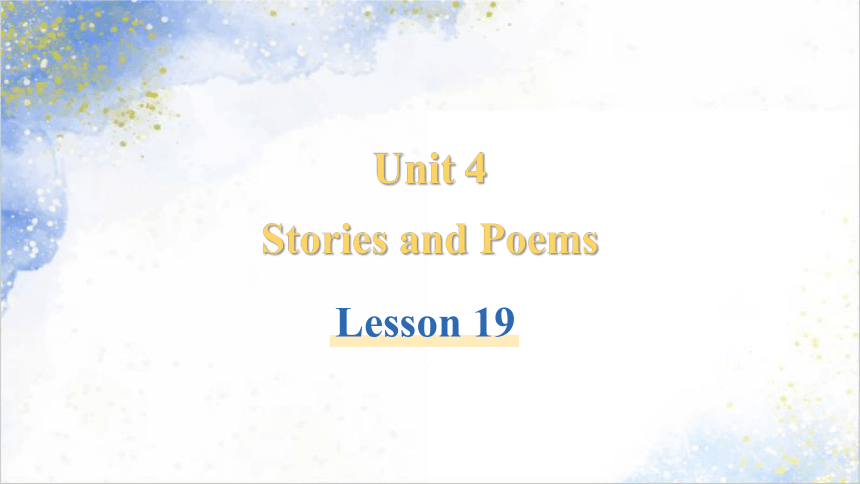 | |
| 格式 | pptx | ||
| 文件大小 | 6.6MB | ||
| 资源类型 | 教案 | ||
| 版本资源 | 冀教版 | ||
| 科目 | 英语 | ||
| 更新时间 | 2024-07-26 15:05:28 | ||
图片预览

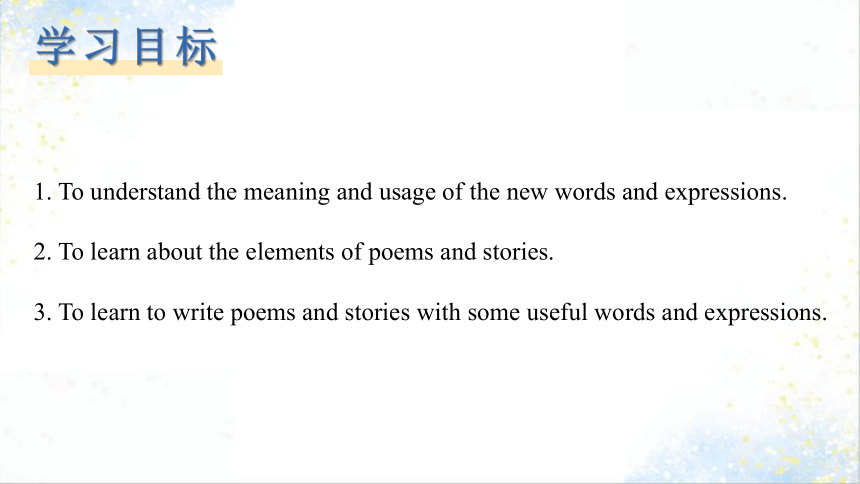
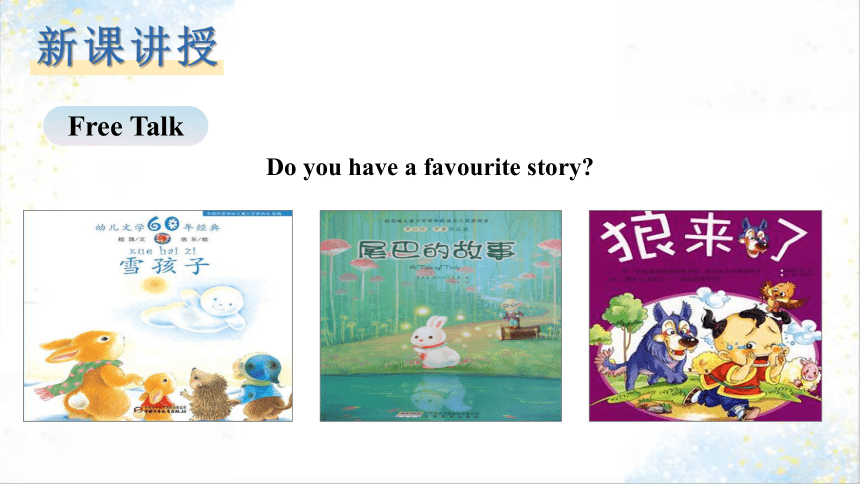
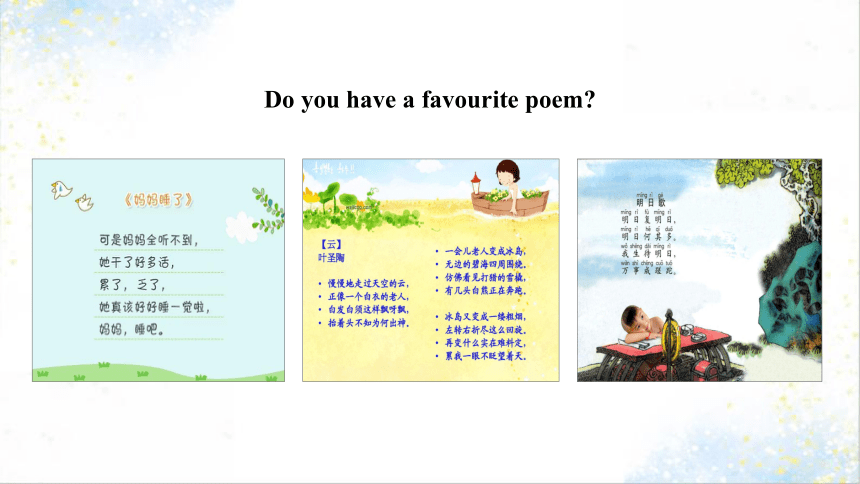
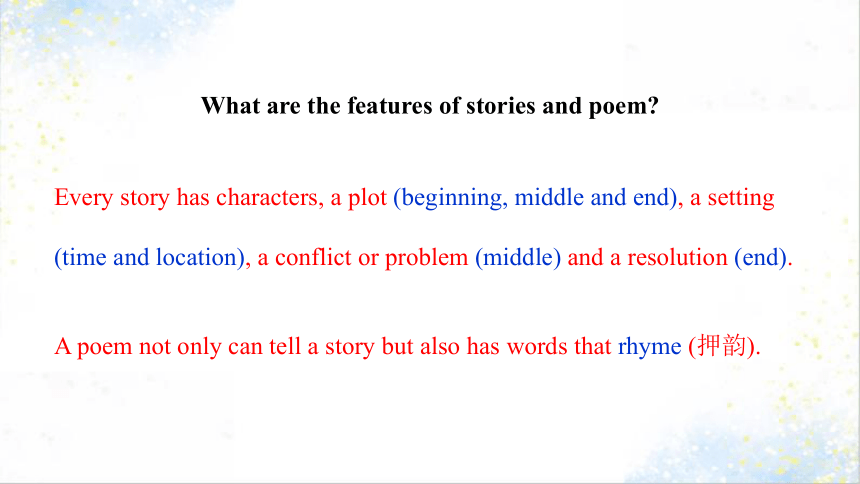
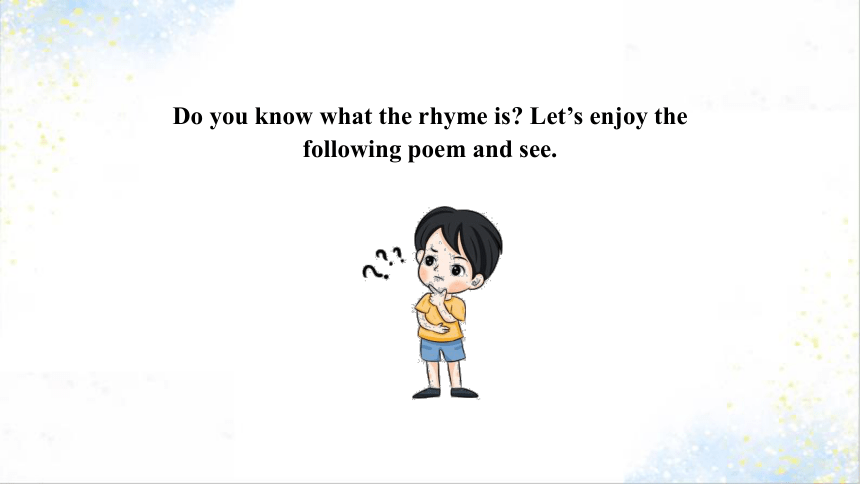
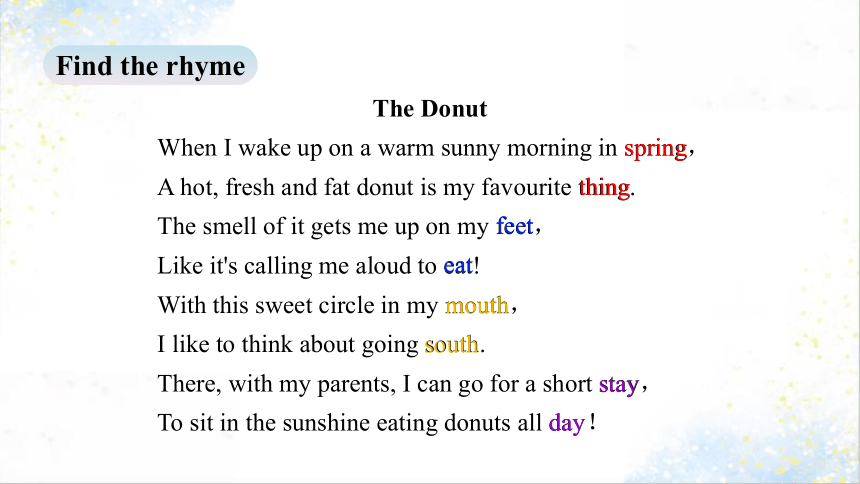
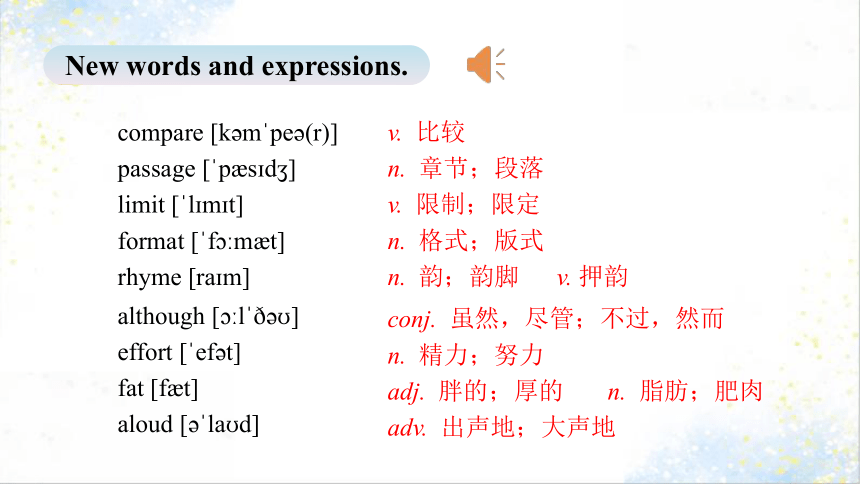
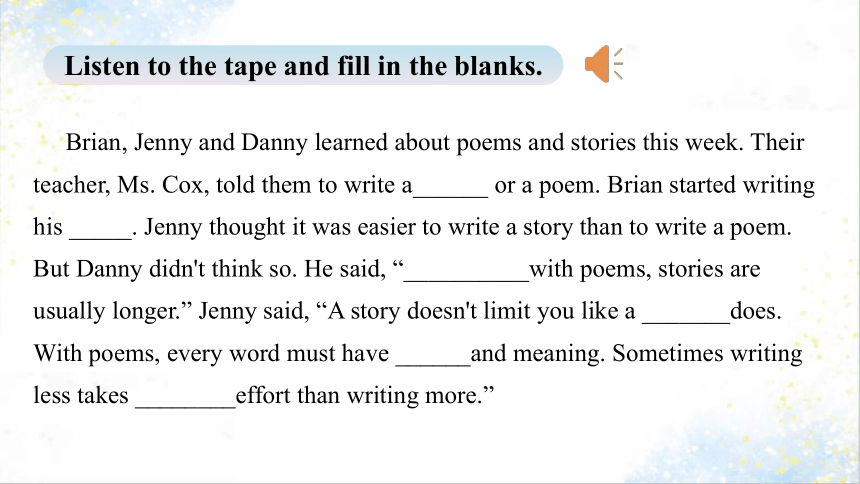
文档简介
(共27张PPT)
Unit 4
Stories and Poems
Lesson 19
1. To understand the meaning and usage of the new words and expressions.
2. To learn about the elements of poems and stories.
3. To learn to write poems and stories with some useful words and expressions.
学习目标
Do you have a favourite story
Free Talk
新课讲授
Do you have a favourite poem
Every story has characters, a plot (beginning, middle and end), a setting (time and location), a conflict or problem (middle) and a resolution (end).
What are the features of stories and poem
A poem not only can tell a story but also has words that rhyme (押韵).
Do you know what the rhyme is Let’s enjoy the following poem and see.
The Donut
When I wake up on a warm sunny morning in spring,
A hot, fresh and fat donut is my favourite thing.
The smell of it gets me up on my feet,
Like it's calling me aloud to eat!
With this sweet circle in my mouth,
I like to think about going south.
There, with my parents, I can go for a short stay,
To sit in the sunshine eating donuts all day!
spring
thing
eat
feet
stay
day
south
mouth
Find the rhyme
compare [k m pe (r)]
passage [ p s d ]
limit [ l m t]
format [ f m t]
rhyme [ra m]
v. 比较
n. 章节;段落
v. 限制;限定
n. 格式;版式
n. 韵;韵脚 v. 押韵
New words and expressions.
although [ l ]
effort [ ef t]
fat [f t]
aloud [ la d]
conj. 虽然,尽管;不过,然而
n. 精力;努力
adj. 胖的;厚的 n. 脂肪;肥肉
adv. 出声地;大声地
Brian, Jenny and Danny learned about poems and stories this week. Their teacher, Ms. Cox, told them to write a______ or a poem. Brian started writing his _____. Jenny thought it was easier to write a story than to write a poem. But Danny didn't think so. He said, “__________with poems, stories are usually longer.” Jenny said, “A story doesn't limit you like a _______does. With poems, every word must have ______and meaning. Sometimes writing less takes ________effort than writing more.”
Listen to the tape and fill in the blanks.
Brian, Jenny and Danny learned about poems and stories this week. Their teacher, Ms. Cox, told them to write a______ or a poem. Brian started writing his _____. Jenny thought it was easier to write a story than to write a poem. But Danny didn't think so. He said, “__________with poems, stories are usually longer.” Jenny said, “A story doesn't limit you like a _______does. With poems, every word must have ______and meaning. Sometimes writing less takes ________effort than writing more.”
story
poem
Compared
poem
power
more
Read the lesson and fill in the blanks with the correct words.
1
Read the lesson again and compare poems with stories.
2
a.It must have a beginning, a middle and an end.
b.Although it is short, every word must have power and meaning.
c.Usually fewer words are used.
d.It is longer and has more words.
e.You have to think about the format.
poems
stories
b, c, e
a, d
1. I haven't decided which one to write yet.
我还没有决定写哪一个。
which one to write 疑问词+不定式短语,在句中作宾语。
eg:I don't know where to go next.
我不知道接下来该往哪儿走。
Language Points
2. Have you finished your English homework yet, Brian
你已经完成英语作业了吗,布莱恩
yet “已经”, 常用于疑问句、否定句末尾, 肯定句句中。
eg:When you reached the village, had the reporter left yet
你到达那个村庄时,那位记者已经走了吗
[拓展] 不同句式中的“yet”
yet 用在疑问句中的意思是“已经”
eg:Have you had your breakfast yet
你已经吃过早饭了吗?
yet用在肯定句中的意思是“仍然,还”。
eg:Last time I saw him he was yet a poor man.
上次我见到他时,他还是个穷人。
yet用在否定句中的意思是“(迄今)还,尚”
eg:It doesn't turn fine yet. 天还没转晴。
[辨析] “still”, “already”与 “yet”
still 仍然, 还 放在系动词后, 实义动词前,表示继续做某事, 多用于肯定句和疑问句中。 He is still standing.
他还在站着。
yet 已经, 仍然, 还 可用于疑问句、否定句、肯定句 There is hope for me yet. 我的事仍有希望。
already 已经 用于肯定句中 He has already finished his drawing.他已经完成了他的画。
已经 用于疑问句的句末,表示吃惊 , 惊讶, 意想不到 Have you finished your homework already 你已经完成你的作业了?
3. Compared with poems, stories usually have longer passages.
和诗比起来,故事通常有较长的章节。
compare v. 比较
compared to/with是过去分词短语作状语,意思是“和比起来”。
eg:Canada doesn't have many people, compared to/ with China.
与中国相比,加拿大人口没有那么多。
compare…with…“把……和……相比”
eg:They always compare them with other students.
他们总是拿他们和其他学生作比较。
compare…to… “把……比作……”
eg:People always compare the dove to the symbol of peace.
人们总是把鸽子比作和平的象征。
[拓展] “compare” 的不同短语
4. But a story doesn't limit you like a poem does.
但是,写故事不像写诗那样使你受限制。
like “像; 如同……”
eg:It rained like the skies were falling.雨下得好像天要塌下来似的。
Do it like I tell you.照我对你讲的那么做。
[拓展] like “像(举例)”
eg:I like collecting coins like British pounds and US dollars.
我喜欢收集硬币, 像英镑、美元。
5. Although a poem has fewer words, it's not always easier to write.
虽然诗歌用词较少,但写起来不总是容易的。
although conj. “虽然,尽管”
eg:Although they're poor, they're always honest.
尽管他们穷, 他们却一直很诚实。
not always “不总是”, 表部分否定。像both, everybody, always, everywhere等含有“总括意义”的词与否定连用表部分否定。
eg:Not all the boys are here. 并非所有的男孩都在这儿。
6. You've already finished 你已经完成了吗
陈述句末尾用问号的句子叫作“陈述疑问句”。
朗读时,句末要用升调。
eg:You've got enough time 你有足够的时间了
You think so 你这样认为吗
7. Like it's calling me aloud to eat!
就像它正在大声呼唤我去吃!
aloud adv. “出声地,大声地”。
eg:She read the note aloud to us.
她把便条大声地念给我们听了。
[辨析] 不同的 “大声”
loud“大声地”, 强调声音很大; 通常用比较级
eg:Try singing louder.试着大点声唱。
aloud“出声地, 大声地”, 指为使人能听见而发声, 常与read等连用。强调发出声音, 出声, 但并不代表声音大。而当aloud修饰laugh, talk, speak等时, 就有声音大的意思了。
eg:He always reads aloud.他总是大声地朗读。
loudly “大声地,吵闹地”, 可指人声、敲门声或其他各种声音, 强调声音高、吵闹、不悦耳。
eg:Don't speak loudly. I'm listening to a story.
别大声说话,我正在听一个故事。
Try to change Danny's poem with words you like. Share your new poem with your classmates.
3
When I wake up on a warm sunny morning in spring,
A________ (adjective),________ (adjective) and
________ (adjective) ________(food) is my favourite thing.
The smell of it gets me up on my feet,
Like it's calling me aloud to eat!
With this________ (adjective)________ (noun) in my mouth,
I like to think about going south.
There, with my ________(person), I can go for a short stay,
To sit in the sunshine eating ________(food) all day!
fresh
delicious
red
apple
sweet
fruit
sister
apples
Share your new poem with your classmates.
Action
Words:
compare, passage, limit, format, rhyme, although, effort, fat, aloud
Sentences:
Have you finished your English homework yet, Brian
I haven’t decided which one to write yet.
But a story doesn’t limit you like a poem does.
Although a poem has fewer words, it’s not always easier to write.
Like it's calling me aloud to eat!
课堂总结
当堂检测
1. Eric arrived on time, ________ it was the rush hour.
A.although B.because C.while D.unless
2. —I will go to Harbin for my summer vacation. What about you
—I haven't decided where ________.
A.go B.went C.going D.to go
3. The math problem is so hard. I really don't know _______.
A.how to do it B.how to do
C.what to do it D.what do
单项选择
A
D
A
Unit 4
Stories and Poems
Lesson 19
1. To understand the meaning and usage of the new words and expressions.
2. To learn about the elements of poems and stories.
3. To learn to write poems and stories with some useful words and expressions.
学习目标
Do you have a favourite story
Free Talk
新课讲授
Do you have a favourite poem
Every story has characters, a plot (beginning, middle and end), a setting (time and location), a conflict or problem (middle) and a resolution (end).
What are the features of stories and poem
A poem not only can tell a story but also has words that rhyme (押韵).
Do you know what the rhyme is Let’s enjoy the following poem and see.
The Donut
When I wake up on a warm sunny morning in spring,
A hot, fresh and fat donut is my favourite thing.
The smell of it gets me up on my feet,
Like it's calling me aloud to eat!
With this sweet circle in my mouth,
I like to think about going south.
There, with my parents, I can go for a short stay,
To sit in the sunshine eating donuts all day!
spring
thing
eat
feet
stay
day
south
mouth
Find the rhyme
compare [k m pe (r)]
passage [ p s d ]
limit [ l m t]
format [ f m t]
rhyme [ra m]
v. 比较
n. 章节;段落
v. 限制;限定
n. 格式;版式
n. 韵;韵脚 v. 押韵
New words and expressions.
although [ l ]
effort [ ef t]
fat [f t]
aloud [ la d]
conj. 虽然,尽管;不过,然而
n. 精力;努力
adj. 胖的;厚的 n. 脂肪;肥肉
adv. 出声地;大声地
Brian, Jenny and Danny learned about poems and stories this week. Their teacher, Ms. Cox, told them to write a______ or a poem. Brian started writing his _____. Jenny thought it was easier to write a story than to write a poem. But Danny didn't think so. He said, “__________with poems, stories are usually longer.” Jenny said, “A story doesn't limit you like a _______does. With poems, every word must have ______and meaning. Sometimes writing less takes ________effort than writing more.”
Listen to the tape and fill in the blanks.
Brian, Jenny and Danny learned about poems and stories this week. Their teacher, Ms. Cox, told them to write a______ or a poem. Brian started writing his _____. Jenny thought it was easier to write a story than to write a poem. But Danny didn't think so. He said, “__________with poems, stories are usually longer.” Jenny said, “A story doesn't limit you like a _______does. With poems, every word must have ______and meaning. Sometimes writing less takes ________effort than writing more.”
story
poem
Compared
poem
power
more
Read the lesson and fill in the blanks with the correct words.
1
Read the lesson again and compare poems with stories.
2
a.It must have a beginning, a middle and an end.
b.Although it is short, every word must have power and meaning.
c.Usually fewer words are used.
d.It is longer and has more words.
e.You have to think about the format.
poems
stories
b, c, e
a, d
1. I haven't decided which one to write yet.
我还没有决定写哪一个。
which one to write 疑问词+不定式短语,在句中作宾语。
eg:I don't know where to go next.
我不知道接下来该往哪儿走。
Language Points
2. Have you finished your English homework yet, Brian
你已经完成英语作业了吗,布莱恩
yet “已经”, 常用于疑问句、否定句末尾, 肯定句句中。
eg:When you reached the village, had the reporter left yet
你到达那个村庄时,那位记者已经走了吗
[拓展] 不同句式中的“yet”
yet 用在疑问句中的意思是“已经”
eg:Have you had your breakfast yet
你已经吃过早饭了吗?
yet用在肯定句中的意思是“仍然,还”。
eg:Last time I saw him he was yet a poor man.
上次我见到他时,他还是个穷人。
yet用在否定句中的意思是“(迄今)还,尚”
eg:It doesn't turn fine yet. 天还没转晴。
[辨析] “still”, “already”与 “yet”
still 仍然, 还 放在系动词后, 实义动词前,表示继续做某事, 多用于肯定句和疑问句中。 He is still standing.
他还在站着。
yet 已经, 仍然, 还 可用于疑问句、否定句、肯定句 There is hope for me yet. 我的事仍有希望。
already 已经 用于肯定句中 He has already finished his drawing.他已经完成了他的画。
已经 用于疑问句的句末,表示吃惊 , 惊讶, 意想不到 Have you finished your homework already 你已经完成你的作业了?
3. Compared with poems, stories usually have longer passages.
和诗比起来,故事通常有较长的章节。
compare v. 比较
compared to/with是过去分词短语作状语,意思是“和比起来”。
eg:Canada doesn't have many people, compared to/ with China.
与中国相比,加拿大人口没有那么多。
compare…with…“把……和……相比”
eg:They always compare them with other students.
他们总是拿他们和其他学生作比较。
compare…to… “把……比作……”
eg:People always compare the dove to the symbol of peace.
人们总是把鸽子比作和平的象征。
[拓展] “compare” 的不同短语
4. But a story doesn't limit you like a poem does.
但是,写故事不像写诗那样使你受限制。
like “像; 如同……”
eg:It rained like the skies were falling.雨下得好像天要塌下来似的。
Do it like I tell you.照我对你讲的那么做。
[拓展] like “像(举例)”
eg:I like collecting coins like British pounds and US dollars.
我喜欢收集硬币, 像英镑、美元。
5. Although a poem has fewer words, it's not always easier to write.
虽然诗歌用词较少,但写起来不总是容易的。
although conj. “虽然,尽管”
eg:Although they're poor, they're always honest.
尽管他们穷, 他们却一直很诚实。
not always “不总是”, 表部分否定。像both, everybody, always, everywhere等含有“总括意义”的词与否定连用表部分否定。
eg:Not all the boys are here. 并非所有的男孩都在这儿。
6. You've already finished 你已经完成了吗
陈述句末尾用问号的句子叫作“陈述疑问句”。
朗读时,句末要用升调。
eg:You've got enough time 你有足够的时间了
You think so 你这样认为吗
7. Like it's calling me aloud to eat!
就像它正在大声呼唤我去吃!
aloud adv. “出声地,大声地”。
eg:She read the note aloud to us.
她把便条大声地念给我们听了。
[辨析] 不同的 “大声”
loud“大声地”, 强调声音很大; 通常用比较级
eg:Try singing louder.试着大点声唱。
aloud“出声地, 大声地”, 指为使人能听见而发声, 常与read等连用。强调发出声音, 出声, 但并不代表声音大。而当aloud修饰laugh, talk, speak等时, 就有声音大的意思了。
eg:He always reads aloud.他总是大声地朗读。
loudly “大声地,吵闹地”, 可指人声、敲门声或其他各种声音, 强调声音高、吵闹、不悦耳。
eg:Don't speak loudly. I'm listening to a story.
别大声说话,我正在听一个故事。
Try to change Danny's poem with words you like. Share your new poem with your classmates.
3
When I wake up on a warm sunny morning in spring,
A________ (adjective),________ (adjective) and
________ (adjective) ________(food) is my favourite thing.
The smell of it gets me up on my feet,
Like it's calling me aloud to eat!
With this________ (adjective)________ (noun) in my mouth,
I like to think about going south.
There, with my ________(person), I can go for a short stay,
To sit in the sunshine eating ________(food) all day!
fresh
delicious
red
apple
sweet
fruit
sister
apples
Share your new poem with your classmates.
Action
Words:
compare, passage, limit, format, rhyme, although, effort, fat, aloud
Sentences:
Have you finished your English homework yet, Brian
I haven’t decided which one to write yet.
But a story doesn’t limit you like a poem does.
Although a poem has fewer words, it’s not always easier to write.
Like it's calling me aloud to eat!
课堂总结
当堂检测
1. Eric arrived on time, ________ it was the rush hour.
A.although B.because C.while D.unless
2. —I will go to Harbin for my summer vacation. What about you
—I haven't decided where ________.
A.go B.went C.going D.to go
3. The math problem is so hard. I really don't know _______.
A.how to do it B.how to do
C.what to do it D.what do
单项选择
A
D
A
同课章节目录
- Unit 1 Stay Healthy
- Lesson 1 What's Wrong,Danny?
- Lesson 2 A Visit to the Dentist
- Lesson 3 Good Food, Good Health
- Lesson 4 Don't Smoke, Please!
- Lesson 5 Jane's Lucky Life
- Lesson 6 Stay Away from the Hospital
- Unit Review
- Unit 2 Great People
- Lesson 7 What Is the Meaning of Lift?
- Lesson 8 A Universe of Thought
- Lesson 9 China's Most Famous "Farmer"
- Lesson 10 Touch the World
- Lesson 11 To China, with Love
- Lesson 12 Guess My Hero!
- Unit Review
- Unit 3 Safety
- Lesson 13 Be Careful,Danny!
- Lesson 14 Accidents Happen
- Lesson 15 My Helmet Saved My Life!
- Lesson 16 How Safe Is Your Home?
- Lesson 17 Staying Safe in an Earthquake
- Lesson 18 Never Catch a Dinosaur
- Unit Review
- Unit 4 Stories and poems
- Lesson 19 A Story or a Poem?
- Lesson 20 Say It in Five
- Lesson 21 The Fable of the Woodcutte
- Lesson 22 The Giant(Ⅰ)
- Lesson 23 The Giant(Ⅱ)
- Lesson 24 Writing a Poem
- Unit Review
- Unit 5 Look into Science
- Lesson 25 Let's Do an Experiment!
- Lesson 26 Keep the Candle Burning
- Lesson 27 Planet Danny
- Lesson 28 The Study of Living Things
- Lesson 29 DNA—The Story of You
- Lesson 30 Science Affects Us
- Unit Review
- Unit 6 Movies and Theate
- Lesson 31 A movie or a Play
- Lesson 32 Moving Pictures
- Lesson 33 The Fisherman and the Goldfish(Ⅰ)
- Lesson 34 The Fisherman and the Goldfish(Ⅱ)
- Lesson 35 Theatres Are Fun!
- Lesson 36 Making Plays Is Fun
- Unit Review
